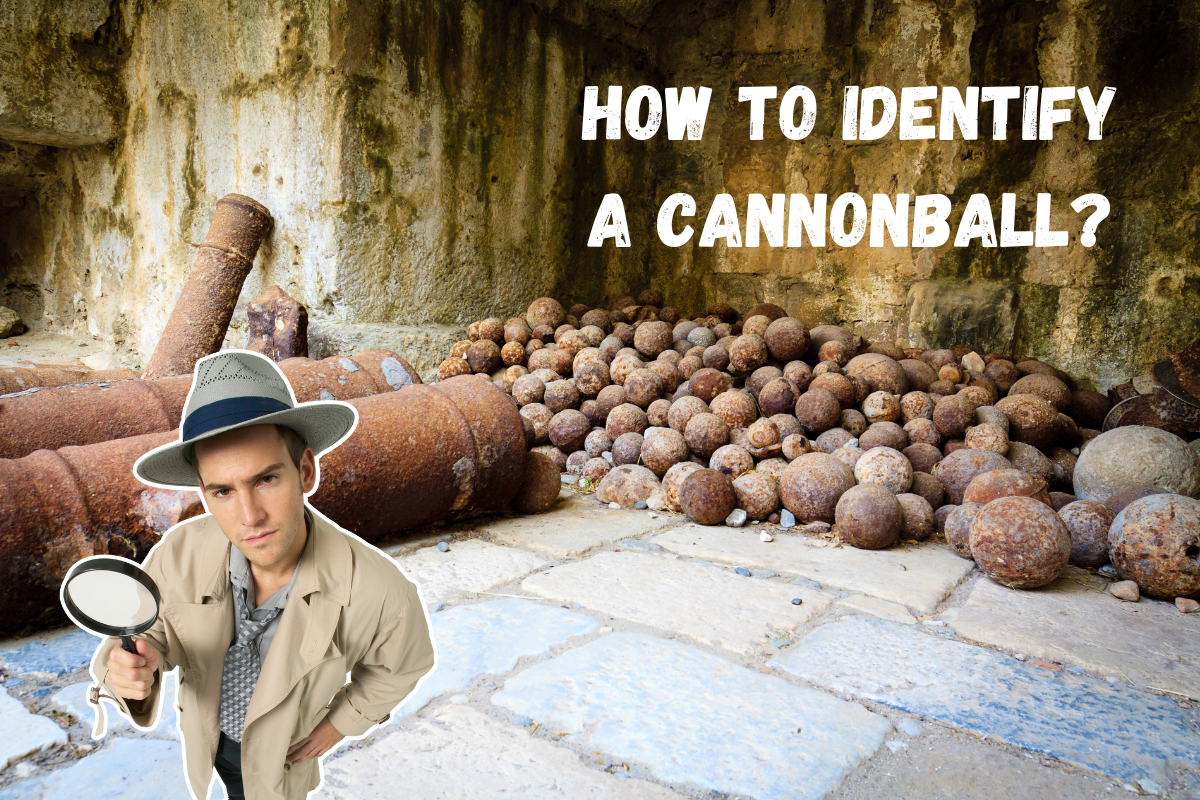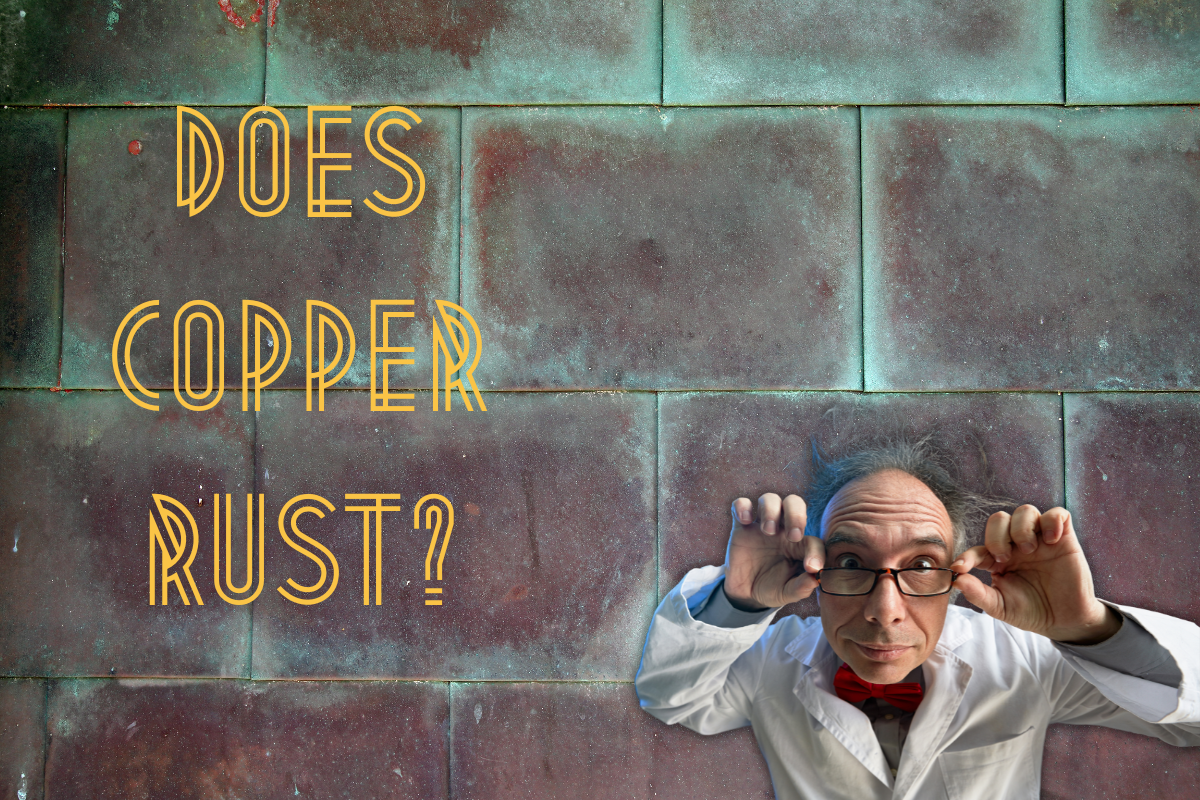If you’ve ever found copper coins while digging in your backyard, or metal detecting on some old property, it’s an exciting moment and among many things, you wonder if it has any worth.
But before you go cleaning them up and trying to sell them or show off your new collection piece, there are a few things you should know. Copper coins can be very valuable, but if you clean them improperly you could damage their value or even erase the parts of the coin that make them special.
In this first article of our cleaning series, we’ll discuss the best ways to clean copper coins so that you can protect their value and history.
** Disclaimer ** – While all the methods below have been tried and tested under different conditions, we recommend consulting a professional before attempting to clean any coin you think to be valuable.
How to Clean Copper Coins Found in the Ground?
There are many tactics you can use to clean a copper coin found in the ground. From vinegar solutions to oil, ketchup, toothpicks, and tumblers, there is no shortage of creative cleaning techniques. But the best way to clean copper coins found in the ground is to not clean them at all.
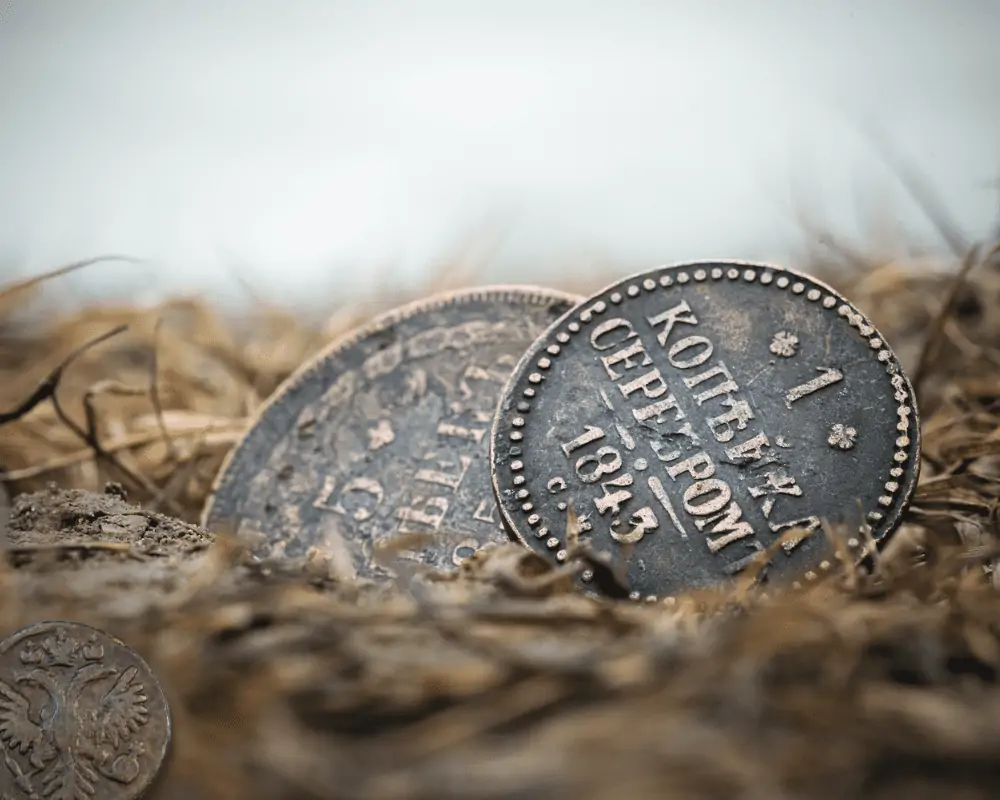
That’s right, we did say to not clean them.
If you’ve stumbled across a copper coin that has been buried for hundreds of years, cleaning it will only risk damaging the coin. The copper will have developed a patina, or oxidization layer, which is green corrosion that helps protect the metal from further deterioration and preserve the details remaining on the face of the coin.
This patina can be very valuable to collectors because it gives insight into how long the coin has been buried and provides them some idea into when in history they are from.
So if you’re looking to clean copper coins you found in the ground for value, our best advice is to not clean them.
But if you insist on cleaning your copper coins, or it’s very clear that the copper coin you have is a penny that could easily be in circulation now, there are ways to get what you want.
Let’s discuss some of those methods.
How Do You Clean Crusty Old Copper Coins?
There are a few ways you can clean crusty old copper coins, but the most popular method is using a vinegar solution containing salt.
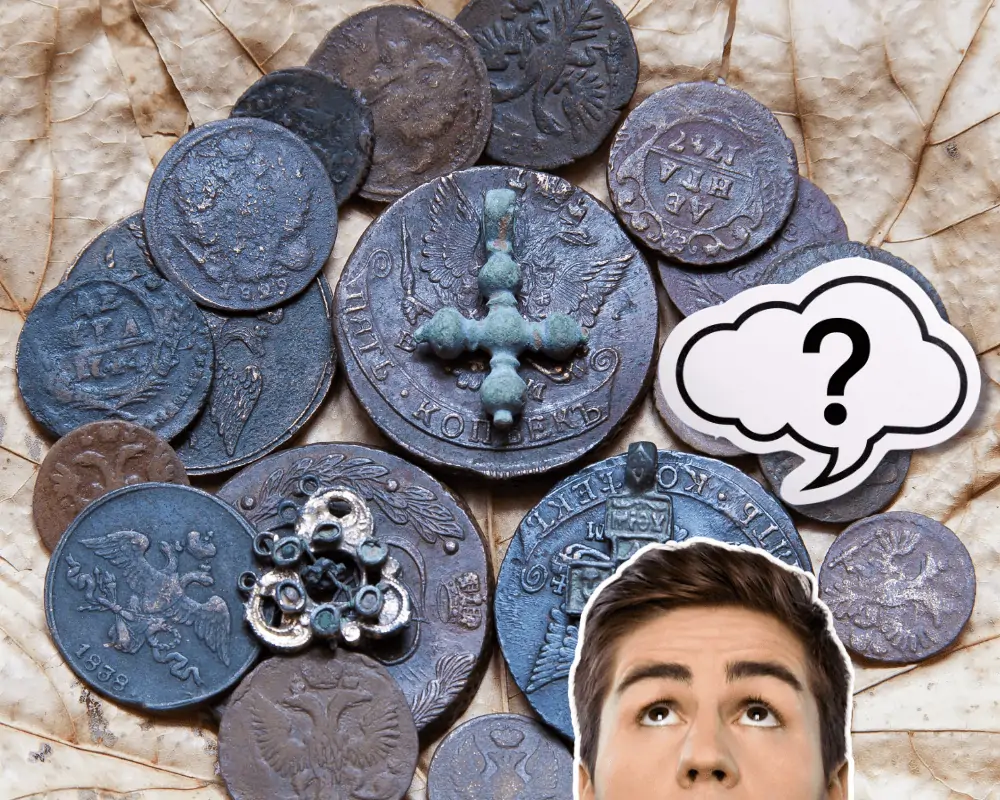
Now, we should reiterate that if you believe the coin has no value or you just intend to keep it for your own uses, then these methods are fine to use at your discretion. Otherwise, we wouldn’t do any of these, at least without proper instruction, or first-hand experience.
And just a word of advice. Regardless of your method or the value of the coin, we would handle each piece with care. Attempt to only touch the coin by its edges to avoid leaving any fingerprints which could devalue the coin.
The vinegar method works by introducing an acid element to the copper coin which will help to dissolve the crusty parts of the coin, and the patina more than likely.
You’ll want to let the coins soak for a few minutes before taking them out and rinsing them in water. You can then use a soft cloth to dry them off and get a better look at your copper coin.

You also have the option of mixing flour with your solution which would create a thick paste that you would rub onto the coin and let it sit before rinsing off.
If you haven’t reached the desired shine you were looking for at this point, you can attempt this process again, leaving it in the solution longer, or you can try a different method that we will cover in a moment.
How Do You Clean Old Copper Coins With Metal Detecting?
Coming across a dirty copper coin through means of metal detecting can be a bit more tricky. While many coins may be found just below the surface, a metal detector allows you to reach a depth where the coin most likely has significant value and history to it.
This means that you’ll want to take extra care in how you clean the copper coin so as not to damage it.
For older copper coins, you are likely to find them with several layers of dirt and grime built-up on the surface of the copper. Including the patina just below the dirt.
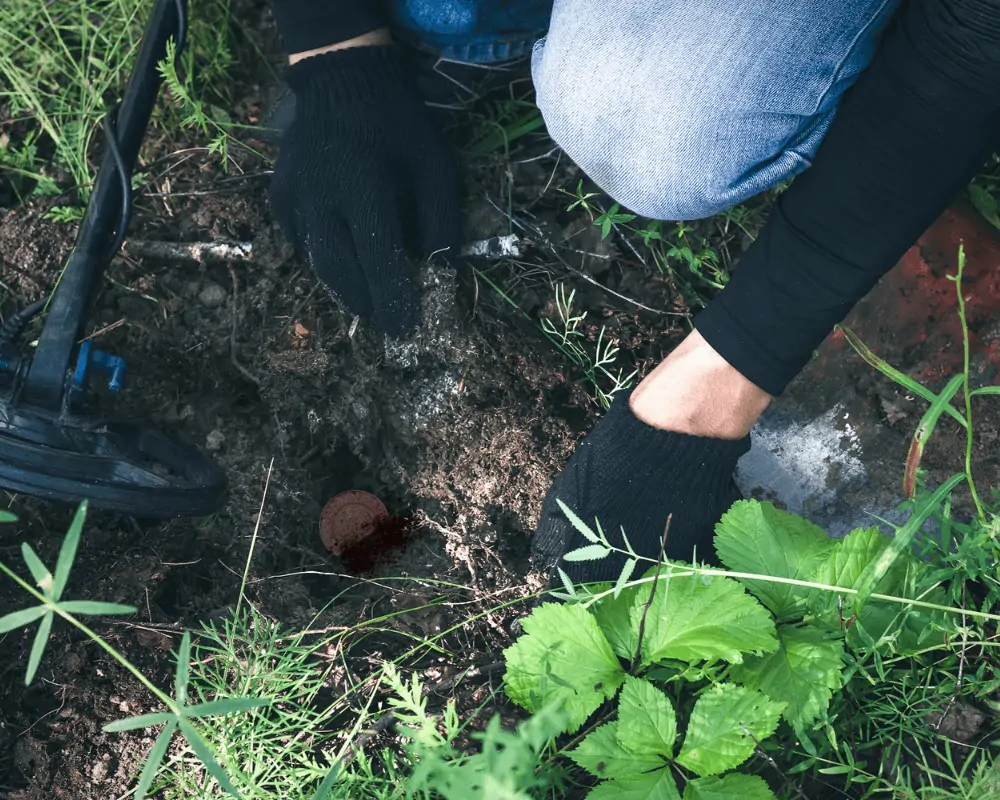
If you’ve decided to clean this old copper coin, there is a less intrusive way, and there is a more aggressive way.
The less intrusive way only requires the use of a toothpick, while the aggressive way takes advantage of more abrasive chemical solutions. We always prefer the less intrusive way as you have a better chance of keeping all the history of the copper coin intact, regardless of its value.
Clean Old Copper Coins Safely
So, how does this better way of cleaning dug copper coins work?
You can clean a dug copper coin by removing layers of dirt, gently, with a toothpick, piece of wood, or your fingernail until getting down to the patina.
From there, wipe your finger on your face for some natural oil, made up of sebum, and transfer it to the face of the coin. This is done by rubbing your finger slowly over every available surface, to bring some shine back to the copper coin, without removing the protective patina layer.
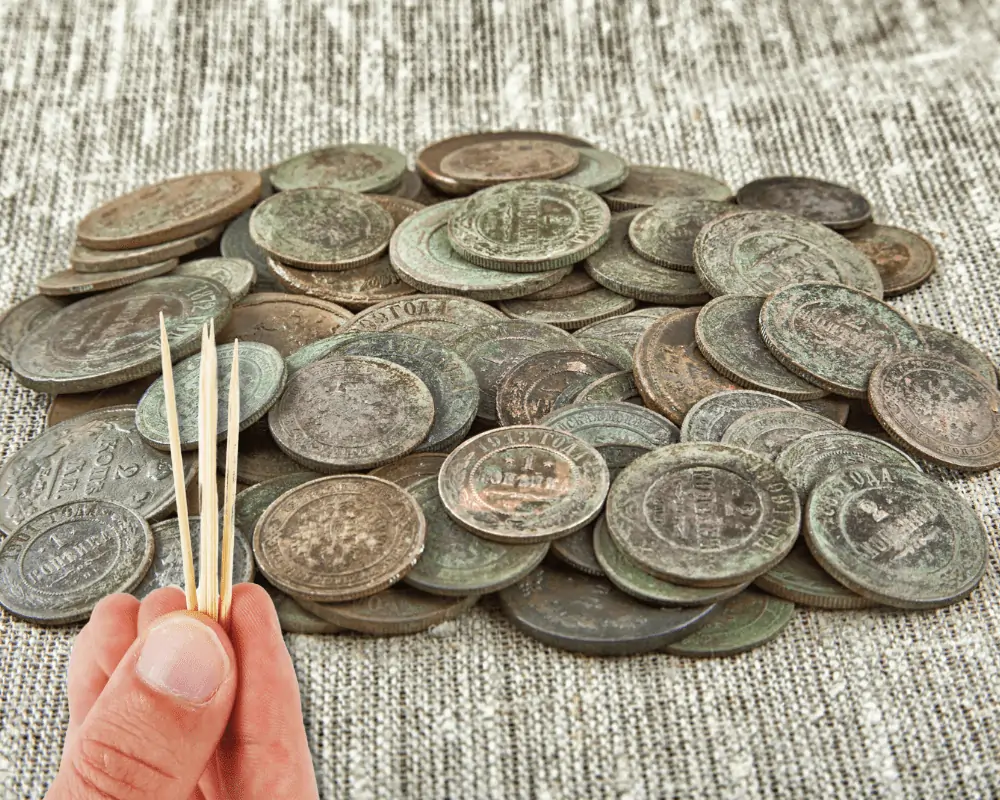
If this doesn’t work, just try some more sebum to enhance the detail of the copper coin.
And if it still doesn’t work, then you can start considering other options if you’re willing to accept the risk.
You may be asking, why can’t I use some water and a toothbrush to rub off the dirt? Well, you could, but then you will most likely be rinsing and rubbing off the layers that are most valuable to you.
Again, try the first way before you make any sort of decision involving chemicals or other more abrasive methods.
Clean Old Copper Coins With Acid or Other Solution
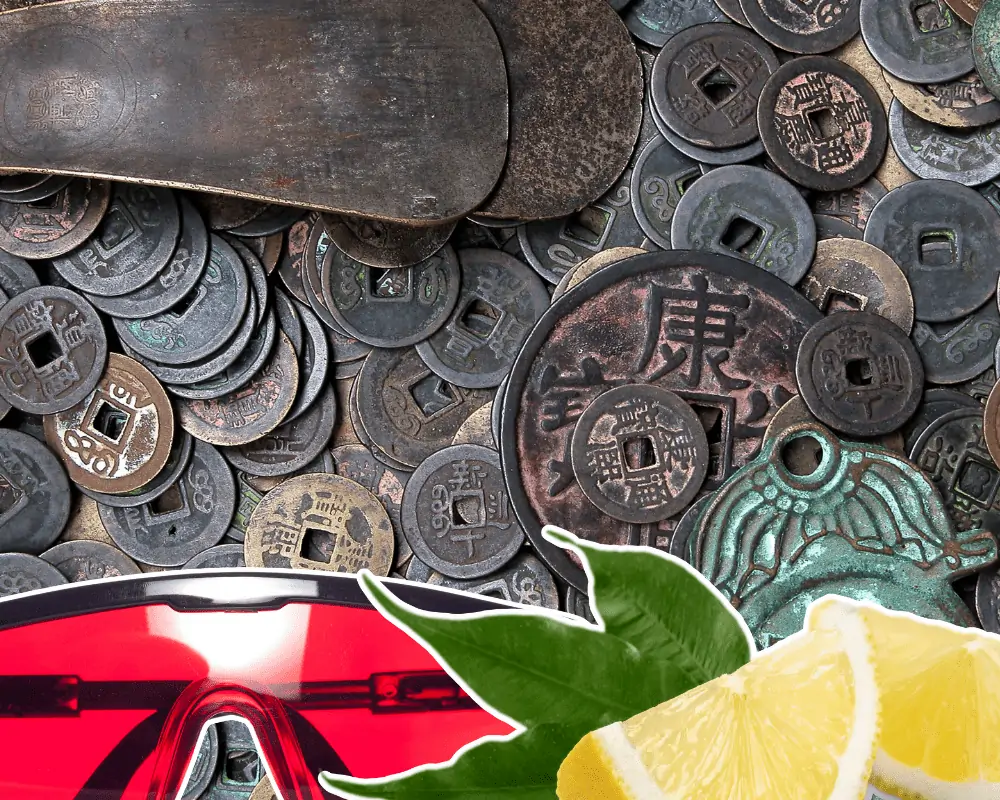
If you’ve decided that you want to clean your copper coin with some sort of chemical solution, then you’ll need a few things.
First, you’ll need safety gloves, an open space to work, preferably outdoors, and some safety glasses.
You don’t want any of the chemicals getting on your skin, in your eyes, or risk breathing it in. And depending on the strength of the solution you’re using, it could do some severe damage.
We hate to sound like a broken record here but we cannot stress this enough. This method should only be used for coins you’ve determined have no unique historical value or monetized purpose.
It’s possible the coins will come out unharmed and look better than expected. But you do take that risk of damaging them beyond repair and being unable to identify them as anything except a piece of old copper, unrecognizable to their former self.
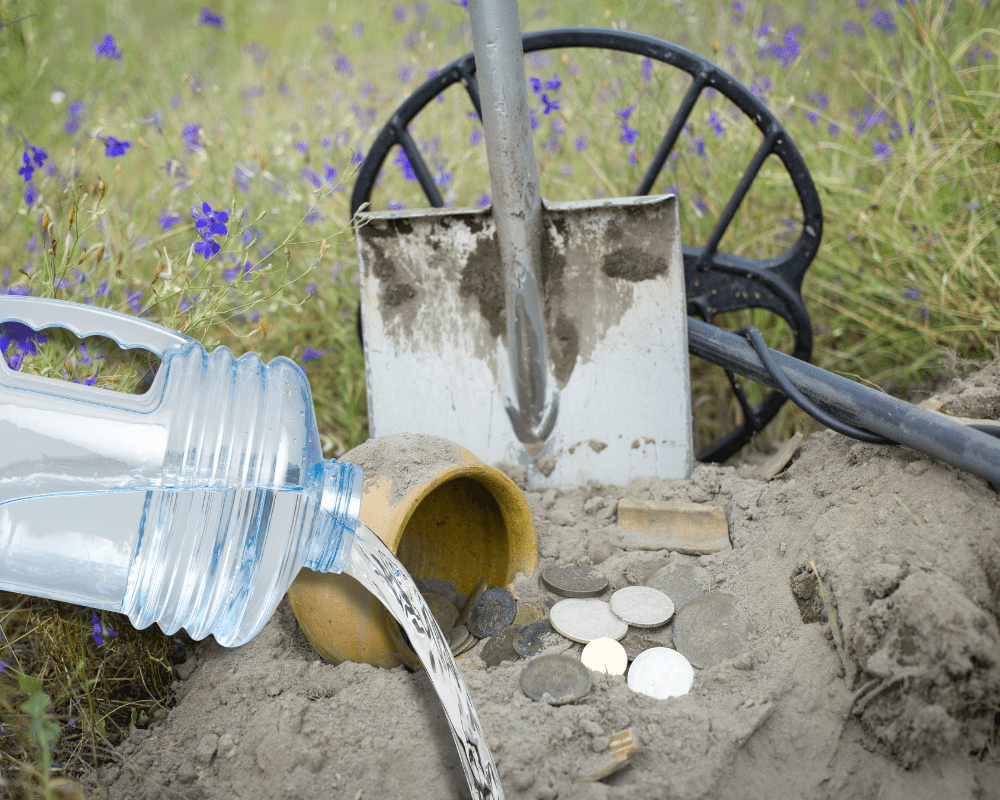
So, what is the first step after gathering our supplies?
You’ll want to soak your recently dug coins in some distilled water. We recommend distilled water because the water from your faucets is most likely treated with some level of fluoride and you don’t want that interfering with your cleaning process.
The goal here is to simply loosen the top layers of dirt as easily as possible. You decide how long to soak them. Some people let them sit for as little as 15 minutes while others allow them to soak for weeks on end.
Once the copper coins have soaked long enough and you see the changes taking place, you can then rinse them off. Using regular tap water here is fine as you aren’t soaking the coins for an extended period. But we would suggest a slow stream of warm water for safer practices.
Next, while rinsing off the dug copper coins, you can take a soft-bristled toothbrush and some toothpaste and gently scrub each part of the coin. Just make sure that you are scrubbing softly while still keeping it under running water.
If you’ve done this effectively, you should have removed all the layers of dirt and left the patina untouched.
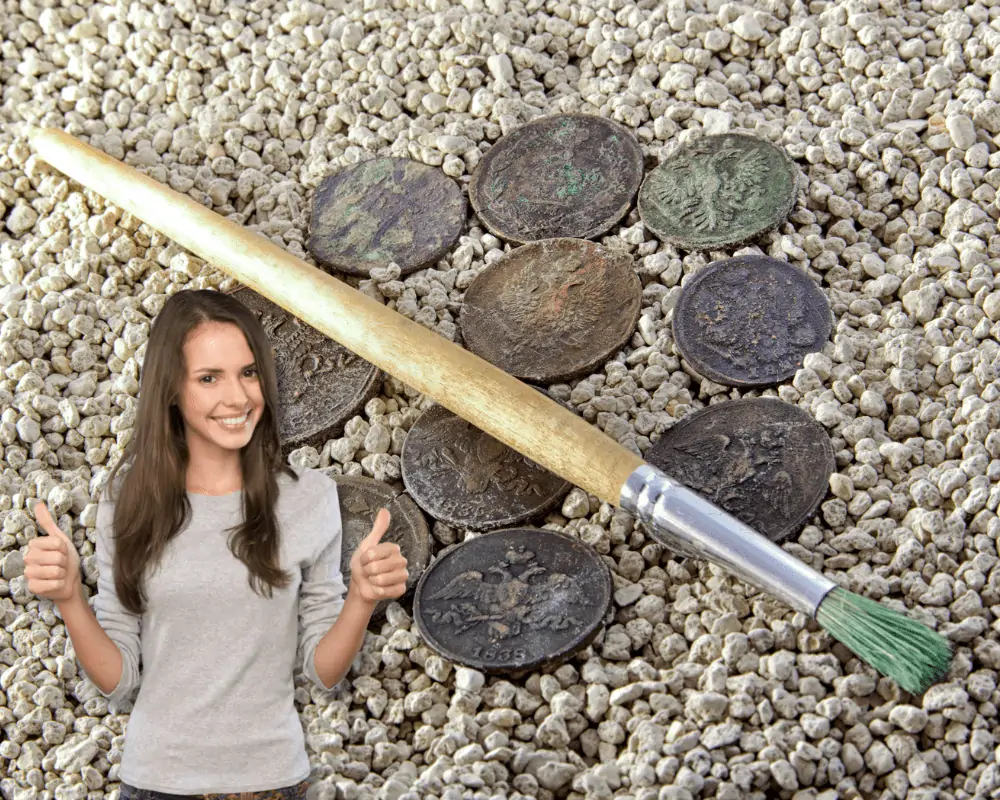
In many cases, your old copper coin now has some life restored to it and you should clearly see some of the finer details you couldn’t make out before.
If by chance, you are not satisfied with the outcome, you could go even further and attempt to soak the copper coins in either ammonia or hydrogen peroxide to really clean the coin.
While we’ve seen many great results by soaking the coins in hydrogen peroxide for up to 12 hours, using ammonia will remove the patina and turn your copper coins an ugly rust (red) color.
While you only have to soak them for 20 minutes or so, the change is drastic. This method calls for even more steps to apply a sort of artificial patina coating made of sulfur and rub an eraser to enhance the details of the copper coin.
By removing the patina and applying the eraser, you are truly wiping away the value of the coin and leaving it with tiny scratches on the surface. This is only ever done if your only intention is to keep the coin in your personal collection, as selling it would be near impossible.
How Do You Remove Green Corrosion From Copper Coins?
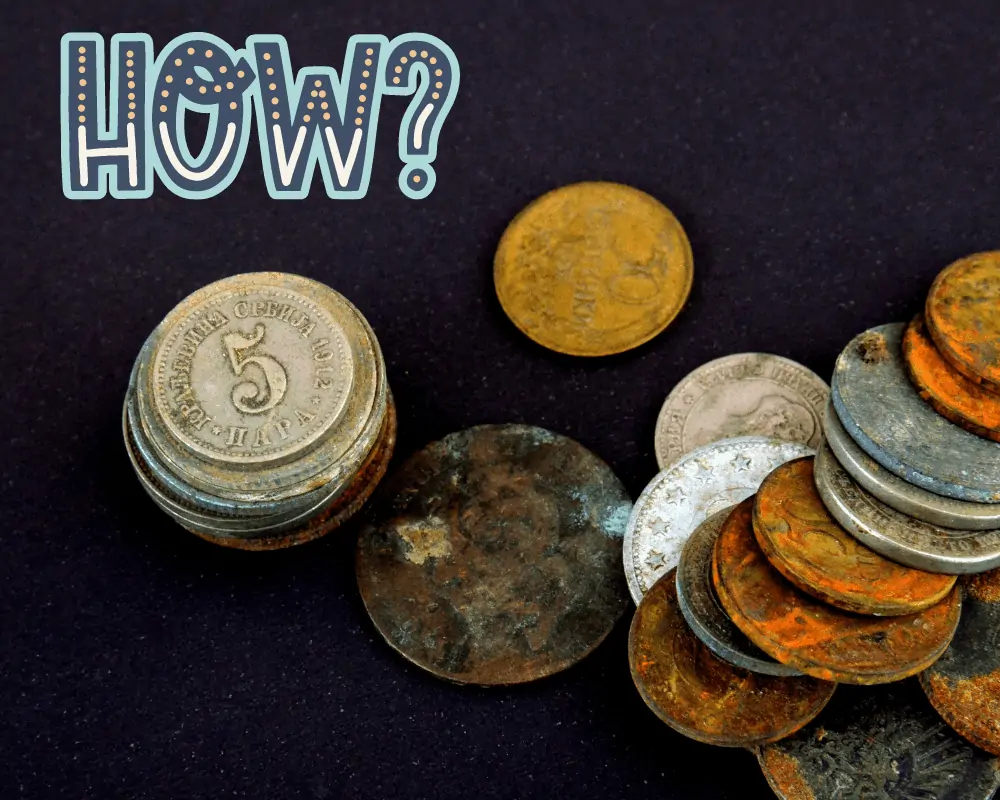
The green corrosion on copper coins, also known as oxidation, is a natural process.
This happens over time as copper is exposed to oxygen and moisture, creating a green patina on the surface of the metal. While many people think this ruins the look of the copper, it actually protects the metal from further corrosion.
So, if you’re trying to remove the green corrosion from copper coins, you’re actually removing a layer of protection.
This isn’t something we would recommend doing unless you are an experienced coin collector or dealer.
There are a few different methods that can be used to remove the green corrosion but they all come with the risk of damaging the coin.
One method is to use an over-the-counter liquid coin cleaner. This will remove the green corrosion from your coin with ease.
Another method is to use a 3 to 1 mixture of water and vinegar, with a pinch of salt. Let it boil before submerging your copper coins and removing them after a few minutes. Quickly rinse and dry your coins thoroughly.
You could also try using a paste made of vinegar and baking soda, which is sure to remove the oxidation from your copper coins.
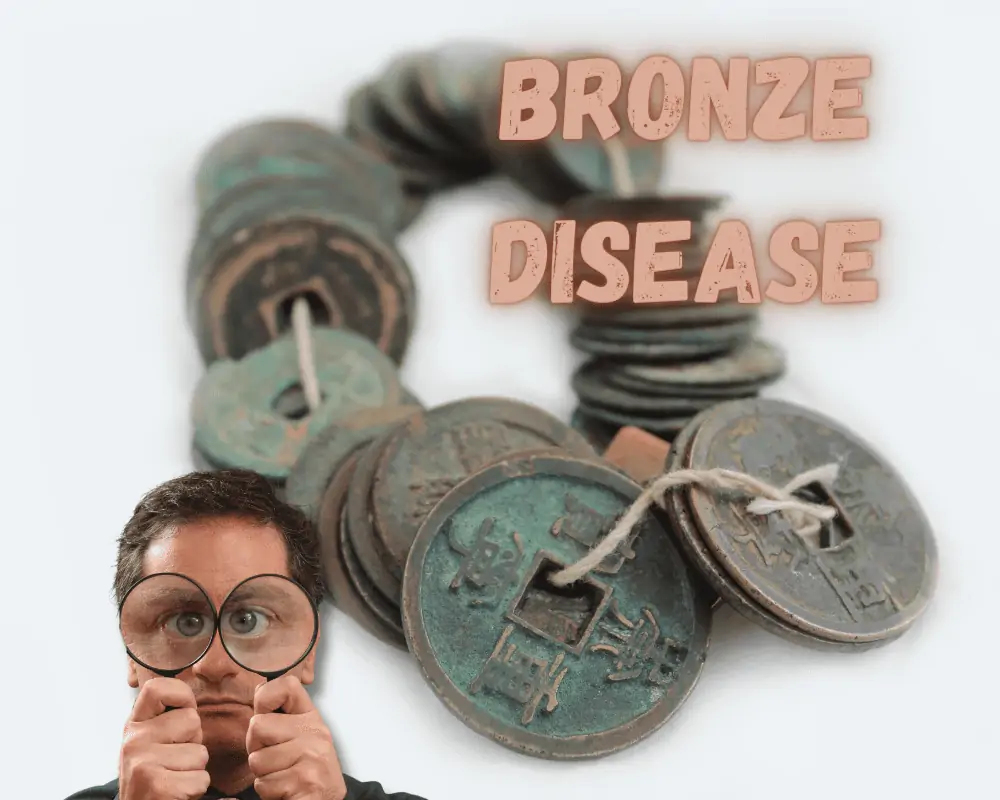
One pro tip we would give out, make sure the green corrosion you are seeing on your copper coin is not something else entirely different, like bronze disease.
This is a serious chemical reaction that copper coins can develop when exposed to water and it will ruin the coin if not treated correctly. Specifically, the chemical reaction of bronze disease will create hydrochloric acid. This acid will eat away at the copper coin and forever ruin the artifact.
It first appears to look like a natural forming patina but is actually a green powder forming on the copper that will ultimately destroy it if not treated.
How to Clean Colonial Copper Coins
Colonial copper coins originate from the British American colonies prior to the U.S. Mint being established in 1792.
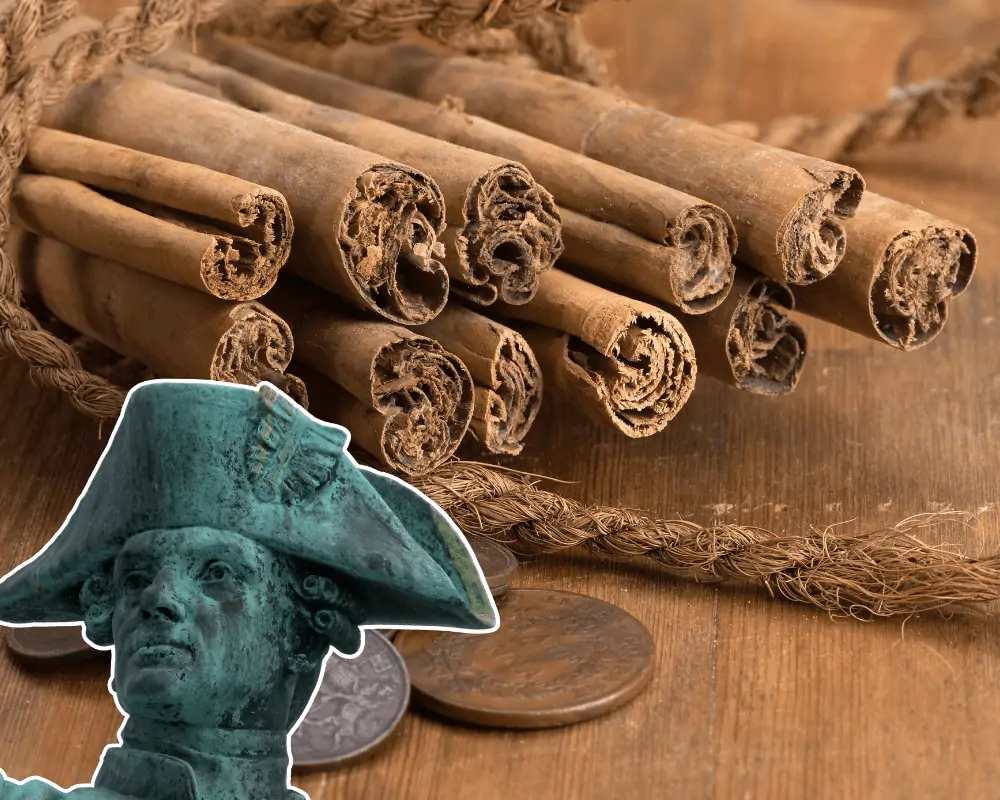
They were used as an exchange of currency within the founded colonies. The colonial copper coins were minted in Massachusetts, Vermont, Connecticut, and New Jersey. However, coins from abroad were also considered colonial currency.
Countries such as Britain and Spain had coins that were widely exchanged throughout the colonies.
Many detectorists have a spray bottle of water and a toothbrush on hand for these finds. We’ll see them gently scrub the copper coin with the toothbrush, after spritzing some water on the coin.
While this is one way to clean your colonial copper coins, it’s not our preferred method.
The best way to clean colonial copper coins is to brush off the layers and layers of dirt with a fingernail or toothpick until you reach the patina. Then, use some of the oil from your own face to wipe along the surface of the copper.
In most cases, it will easily bring the details of the colonial copper coin to the surface.
We described this method earlier and in our opinion, it’s one of the better and safer ways to go about cleaning copper coins. It’s popular throughout the metal detecting world and it gives you an idea of how much more treatment a coin may need without damaging the most important parts of your find.
How Do You Clean Copper Pennies Without Damaging Them?
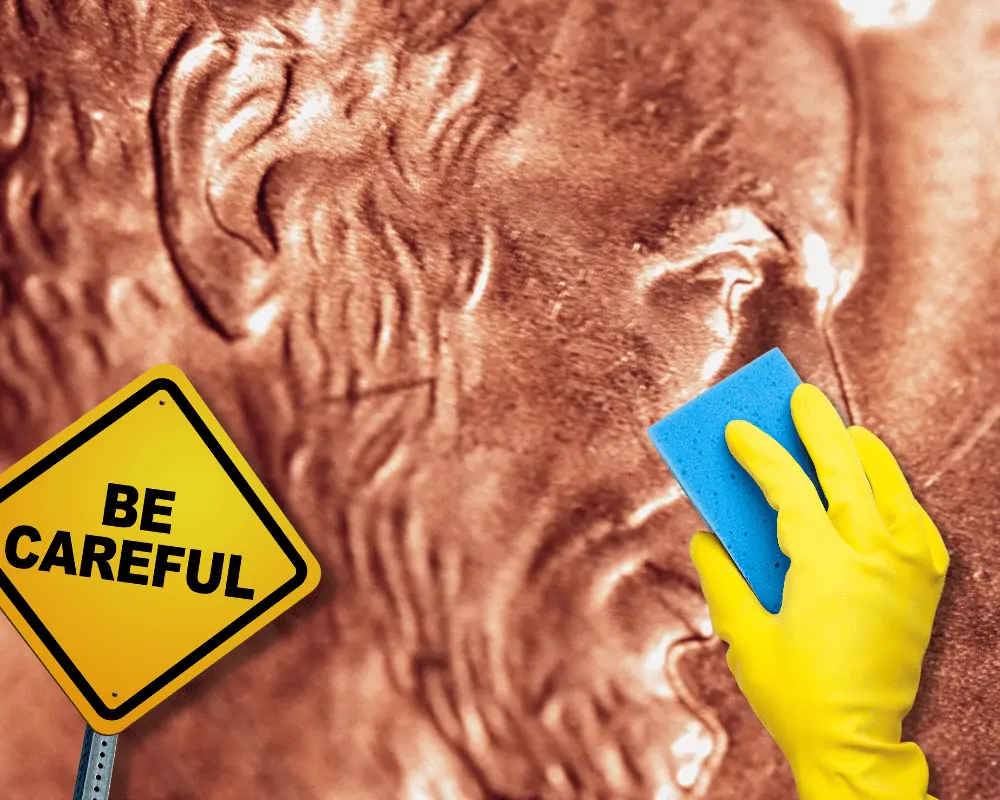
When it comes to cleaning copper pennies, we don’t have to be as careful as you would with a colonial copper coin. Because of this, our options really start to open up.
We’ve mentioned a few different methods already, but now we will go into a bit more detail and help you test out some alternative strategies.
Vinegar
There are several ways to include vinegar in copper cleaning. As we’ve previously stated, vinegar contains levels of acidity that are great for stripping away dirt and grime.
One variation of the vinegar method is to mix a bowl of vinegar and salt, stirring the solution until the salt dissolves. Once dissolved, you submerge the copper pennies and allow them to sit for several minutes.
Be sure to flip the coin on each side and when finished, pull the pennies out, brush the areas needing work with a soft bristle toothbrush, and rinse with water.
Ketchup
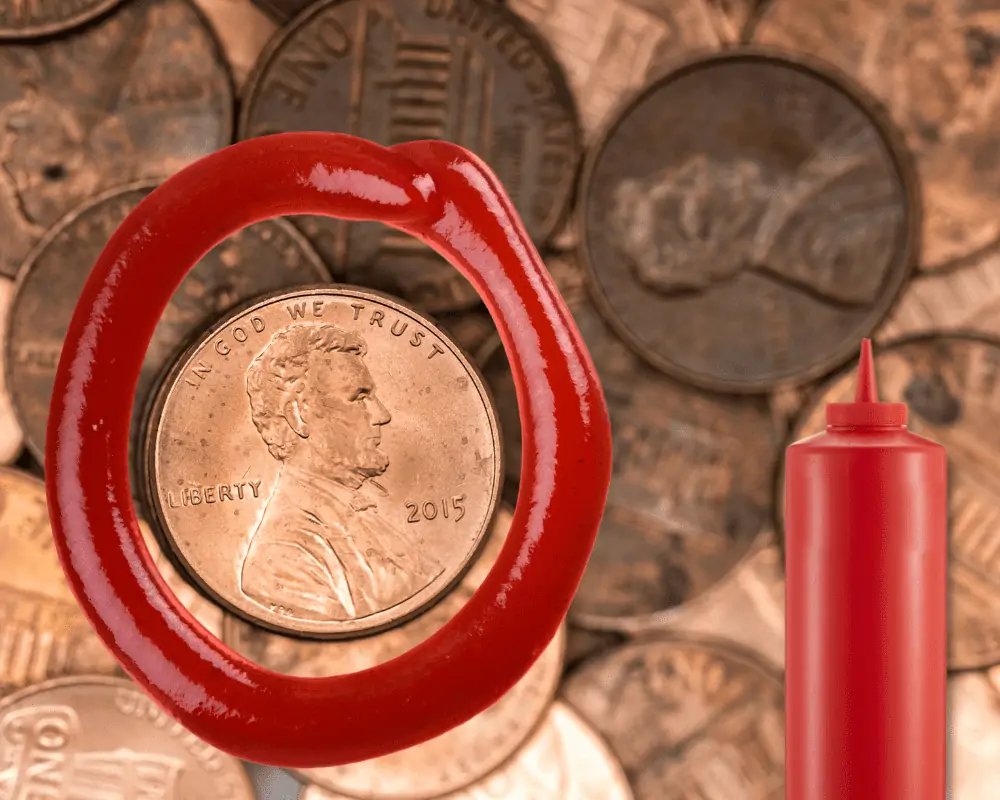
This one may sound a bit strange, but it’s actually a very effective copper penny cleaning method. All you need is some ketchup, a toothbrush, baking soda, and some water.
First, coat the copper penny in ketchup, rubbing it in with a toothbrush. Next, sprinkle a bit of baking soda and water in a separate area, mixing it until it creates a paste. Finally, take the toothbrush and rub the paste into the surface of the penny and watch as the shine comes back better than ever.
This works because the acidity in the ketchup breaks down the grime on the copper penny, while the baking soda works as a mild abrasive to remove any remaining residue.
Lemon Juice
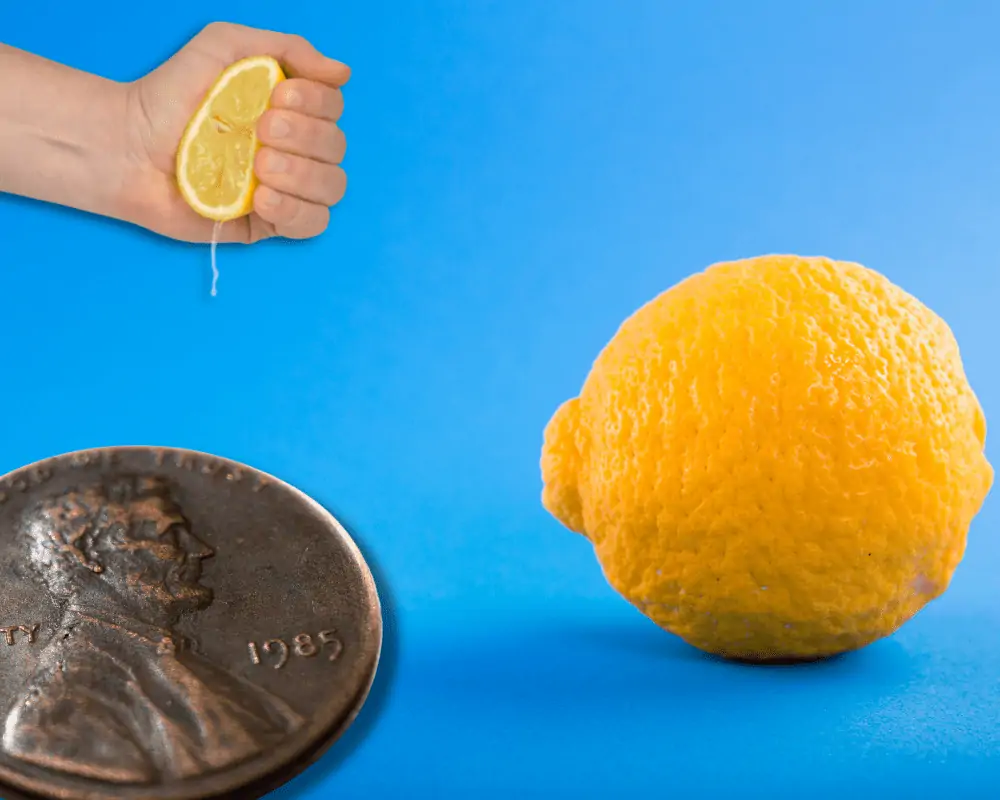
Lemon juice is another great option for copper penny cleaning because it also contains high levels of acidity.
To use this method, you’ll need lemon juice and regular old salt. Simply combine the two ingredients and submerge the copper penny, letting it soak for a few minutes. After some time, remove the pennies and rinse them off with water.
What’s great about this method is it doesn’t require you to scrub down the surface of the penny, as with the other methods.
This is done because the citric acid in the lemon juice will naturally break the bond between the copper and the oxygen atoms. This bond is what creates copper oxide.
Adding the salt only intensifies the chemical reaction and increases the separation of the bond.
How Do You Clean Copper Coins without Losing Value?
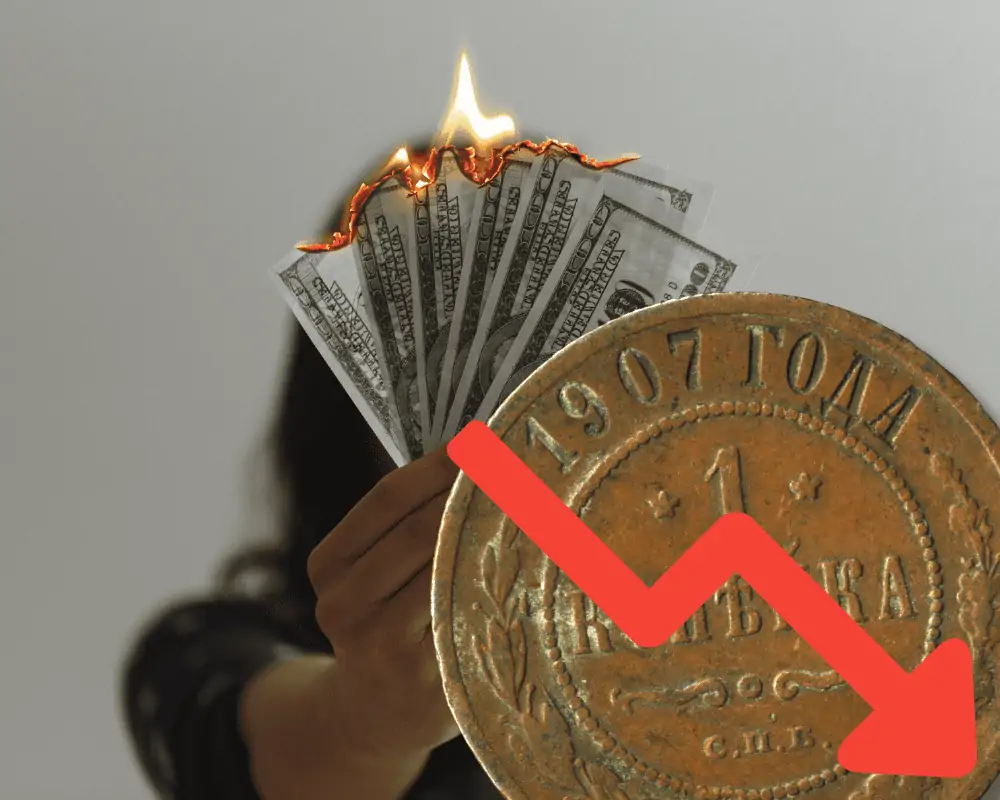
As you can see, there are quite a few ways to clean copper coins, but each comes with possible risks. But what if you want to clean the coin and still preserve its value?
There are still a few things you can do to make sure your copper coin retains its value over time.
The first is to simply avoid cleaning the coin if at all possible. This may seem like common sense, but you’d be surprised at how many people try to clean their copper coins, thinking it will make them more valuable.
Copper coins are often found in the ground, which can cause them to become dirty or tarnished. If this happens, the best course of action is to simply leave the coin as is.
If you find a copper coin in the ground and it is just completely unrecognizable and determining its value is impossible, then we’d recommend seeking out a professional.
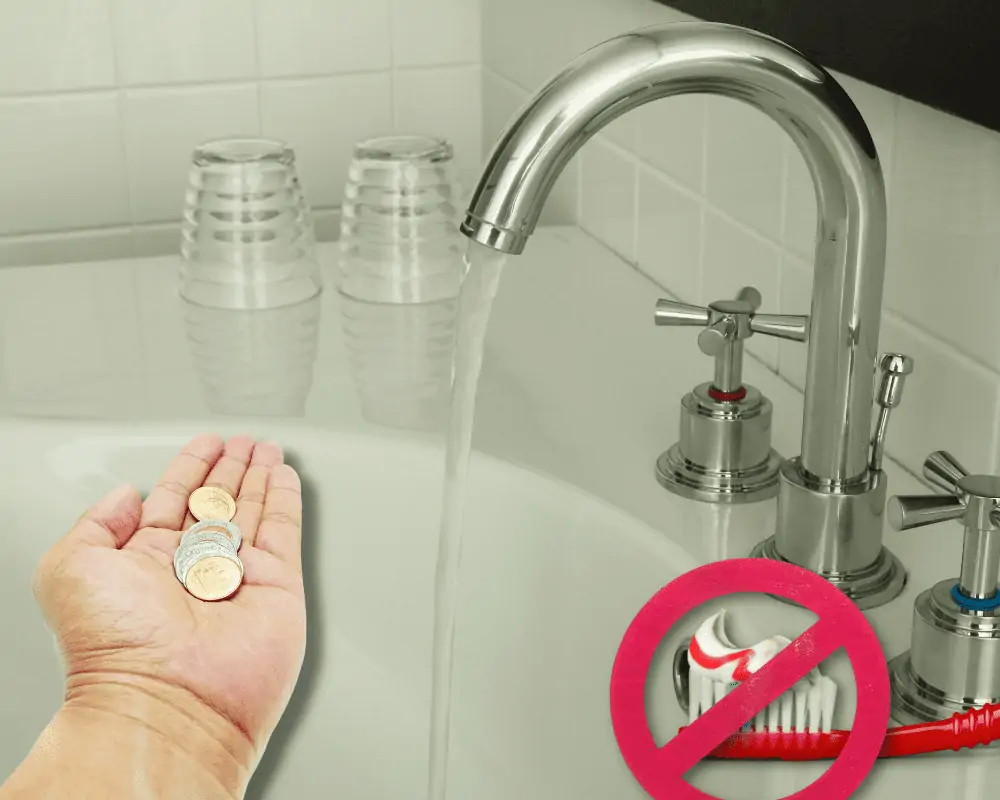
If you’re willing to do it yourself, you can run it under a steady stream of water in the sink. Be sure to have it set at a comfortable temperature, not too hot or cold.
From there, you will gently rub the dirt and debris from the coin with your finger. You don’t need a toothbrush for this as your main purpose is to preserve the value and the wrong amount of pressure from a toothbrush could certainly leave the copper in bad shape.
When drying the copper coin, just pat it with a soft towel. Rubbing it against your clothing or with a Bounty paper towel could easily indent the surface. Maybe not to you, but a collector would certainly notice it.
Your other option is to use some acetone.
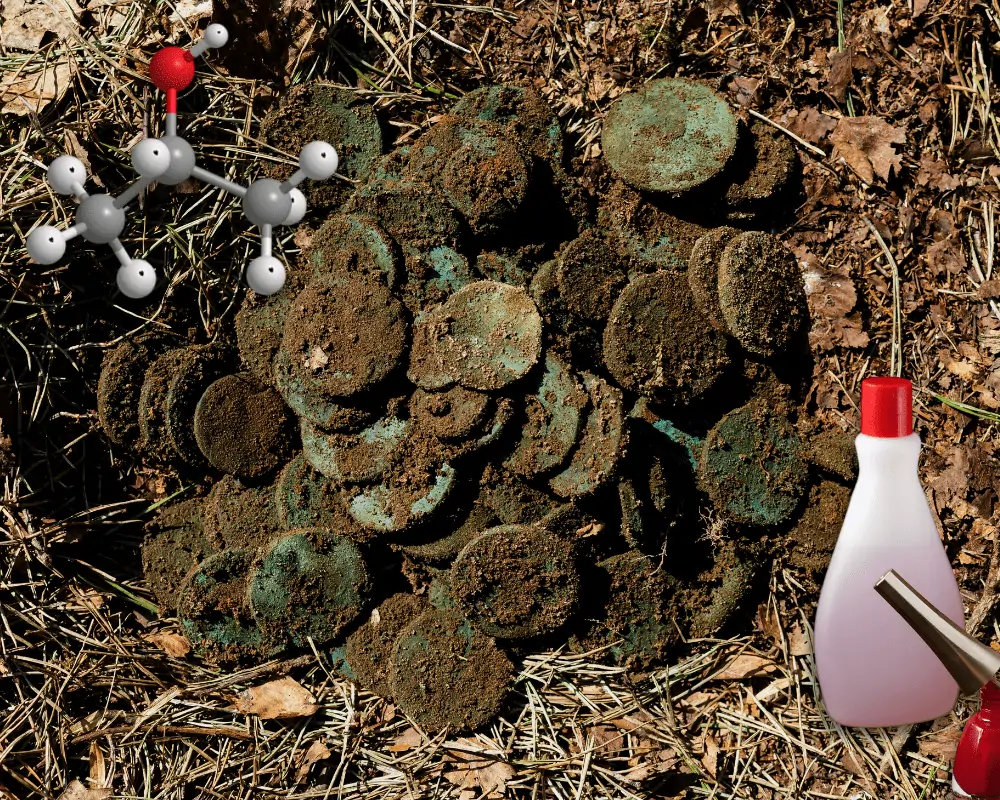
Acetone is a solvent that can be found in nail polish remover.
To use this method, you’ll want to find a container that will hold the acetone for you, as acetone can eat through many materials, like plastic. However, there are some plastics that can handle acetone. We’d recommend finding a Teflon plastic material for this cleaning process.
Once you’ve found a suitable container, fill it with acetone and then drop in the copper coin. Let it soak for about 15 seconds before flipping the coin for another 15 seconds.
After 30 seconds, remove the copper coin from the acetone and pat it dry with a soft cloth towel.
FAQs About Cleaning Copper Coins Found in The Ground
While we covered some of the more popular, right, and wrong ways to clean copper coins you found in the ground. There are still questions worth asking and some clarifications needed to be made.
So, let’s jump in before you rush off to clean any newfound copper coins.
How to Clean Old Copper Coins without Damaging Them?
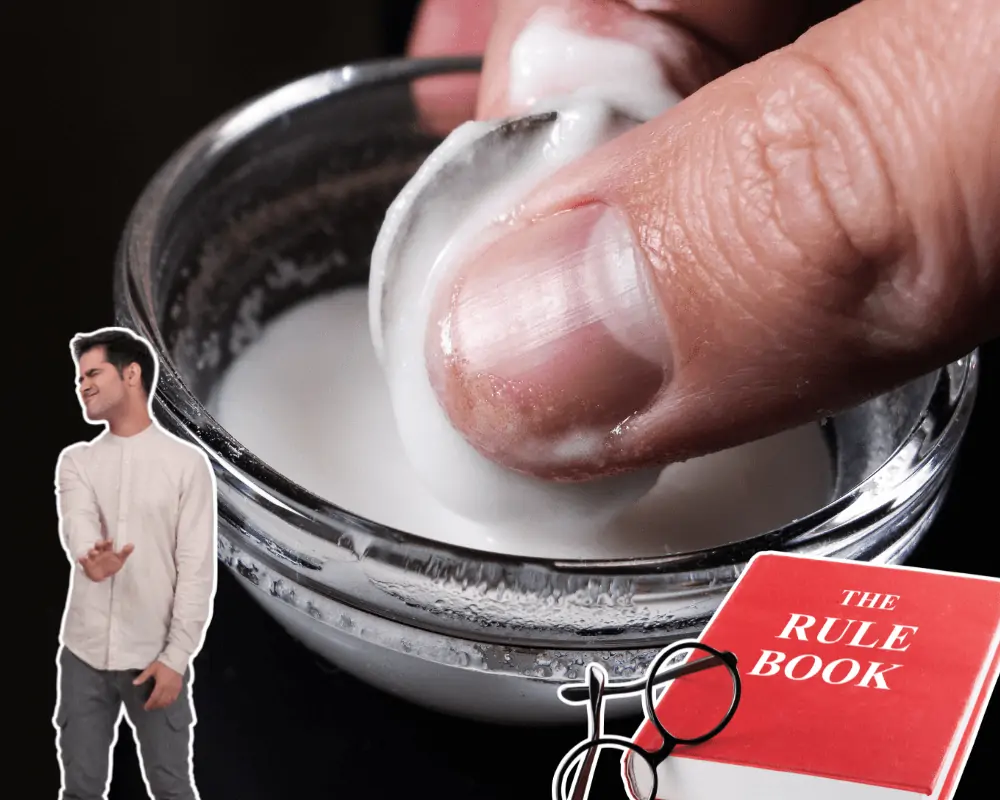
This is a great question and one worth asking before you go about cleaning your copper coins.
We’d suggest going back to our answer on how to clean coins without losing their value, as the same methods apply.
But, for your benefit, here is a list of rules to follow so as to not damage your old copper coins when cleaning them.
- Just don’t clean them!
- Have a professional clean them if you think they have value
- If you must clean them, don’t use solutions containing too much acidity
- Don’t brush coins clean with rough equipment
- Don’t clean them in the same solution as other metals as colors will bleed
- Know the difference between dirt, patina, and alternative corrosion
- Again, just don’t clean them…
How to Clean Copper Coins with Coke?
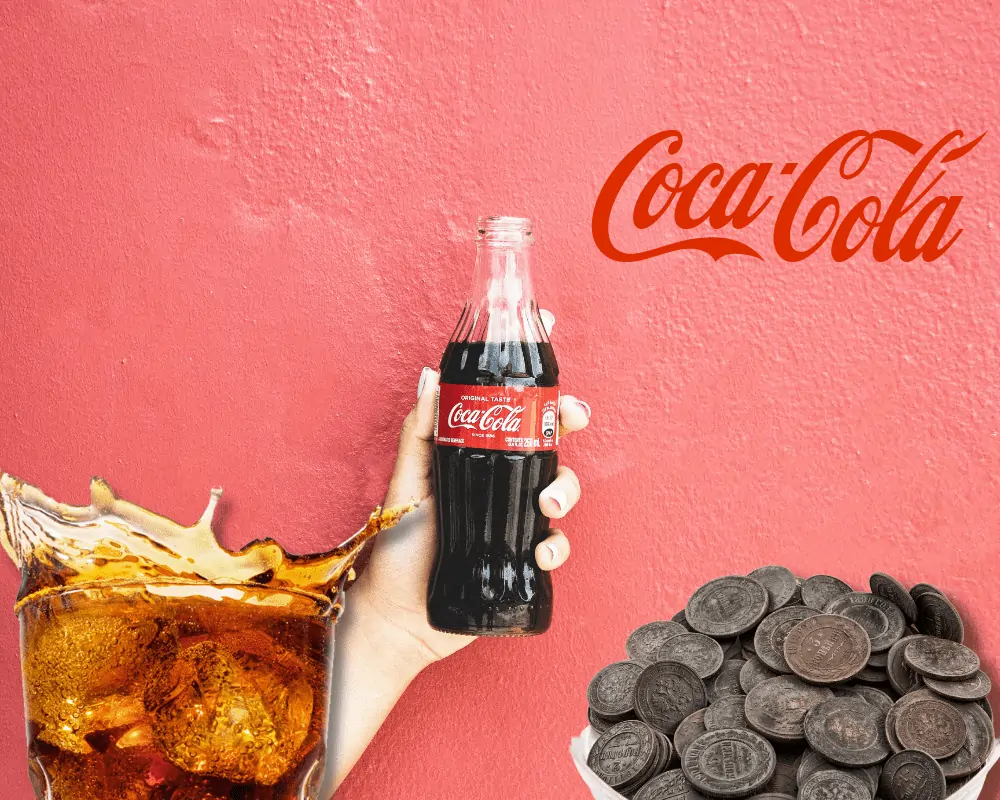
You can clean copper coins with coke but we’d recommend only doing this with coins currently in circulation or those not having any value to you.
Coke or Coca-Cola contains phosphoric acid which is capable of dissolving the bond that creates copper oxide.
To clean copper coins with coke, you simply place the copper coins in a cup or container, pour in some coke until the coins are submerged, and let them soak for a few minutes.
After a few minutes have passed, you can check on the coins to determine if more time is needed. However, we would not let them sit any longer than 20 minutes.
If no more time is needed, remove the copper coins from the coke and rinse them off with water.
Once you’ve rinsed them, you can use a soft cloth to dry your copper coins.
Does Vinegar Damage Copper Coins?
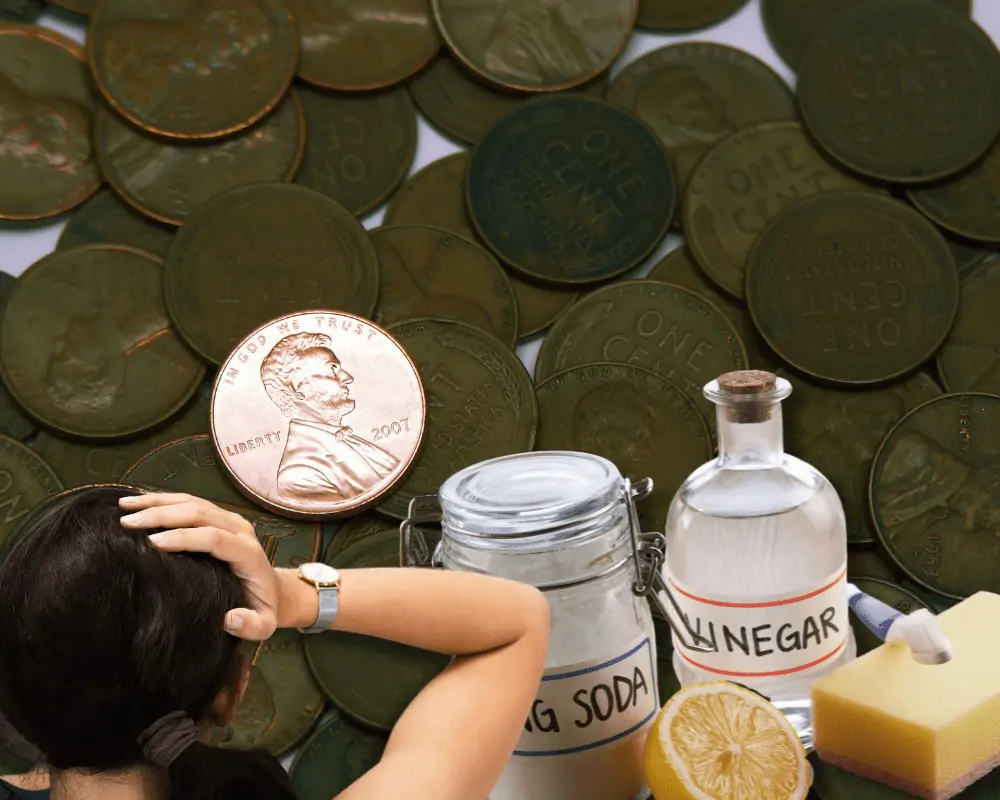
Yes, vinegar does damage copper coins. Vinegar is an acidic solution and is, therefore, capable of stripping the copper coin of its patina.
The same goes for any citrus-based solutions as they also contain acidity that can damage copper coins.
Now we know it’s popular to use vinegar and lemon juice when cleaning copper, and as we’ve already said, if the coin holds no value to you or historical importance, you can use these cleaning methods. But we still wouldn’t let them soak any longer than necessary.
While the metal itself will not be damaged, exposure to vinegar can absolutely damage its value by risking the condition of its protective layer.
How to Clean Copper Coins at Home?
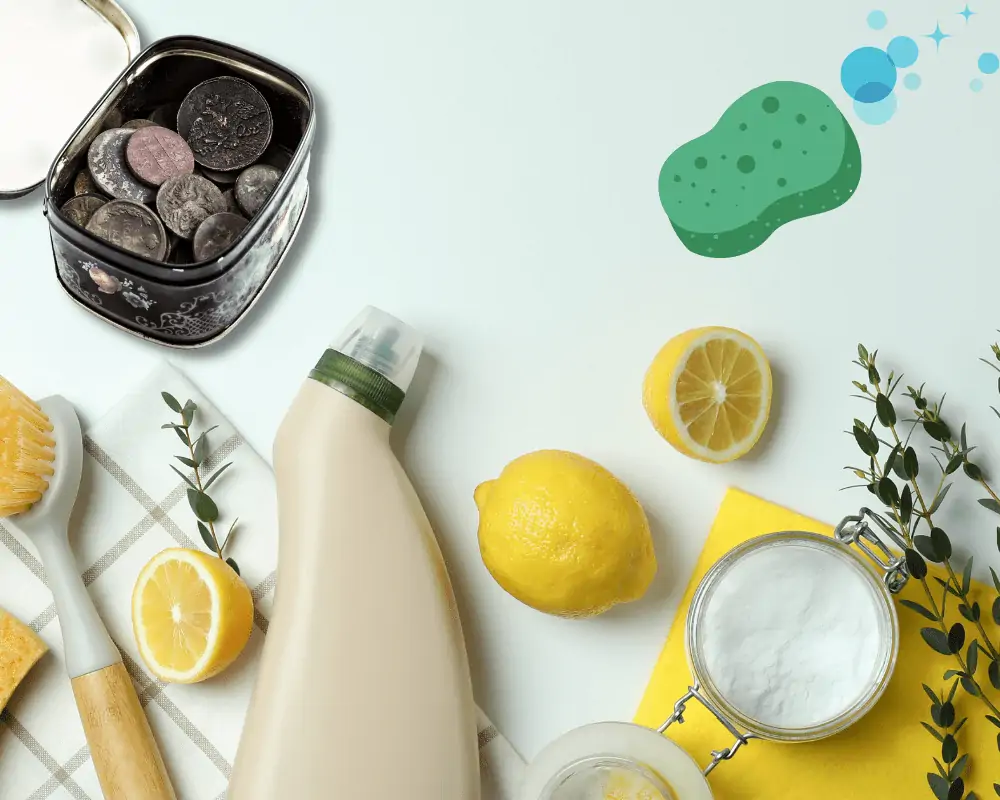
All of the methods we’ve discussed can be done at home to clean copper coins.
If you have some non-valuable copper coins you want to clean at home, besides the vinegar, lemon, ketchup, or any of the other options above, you can also try one of these methods:
- Hand soap with water
- Andre’s Pencils – These are some fantastic pencils specifically used to clean coins
- Copper soap
- Soak in Olive Oil for several months
Should I Clean Old Copper Coins?
Broken record here?
You should not clean old copper coins as cleaning them will ultimately risk losing their value and the unique details that make them special.
If you have the motivation to sell your coins at any time, you definitely do not want to clean them. Coin collectors and professional auction houses will use every available resource to inspect the coin and will grade it based on its condition.

A copper coin in excellent, uncleared condition will garner a higher value than one that has been cleaned or damaged. Collectors actually prefer you to not clean anything off your find as they like to garner any information possible about the copper coin. Each layer that you remove is a possible clue that disappears forever.
Cleaning copper coins is also risky because you can permanently damage the coin beyond repair. Copper is one of the softer metals like gold and brass and can be easily scratched or nicked.
Once you’ve scrubbed away the patina, there’s no going back!
Final Thoughts
If we haven’t been able to convince you not to clean your copper coins by now, we know we won’t be able to.
So, if you plan on moving forward, let us just recommend that you practice first before attempting to clean any coins of significance. Start rounding up those pennies you’ve dug up and pick out some of the more tarnished copper pieces.
Take this opportunity to practice any and every method we’ve mentioned. Learn what works and what doesn’t. Find out what layer of dirt you’re willing to live with on an old copper coin. Because each layer gone is just that much closer to wiping out its history.
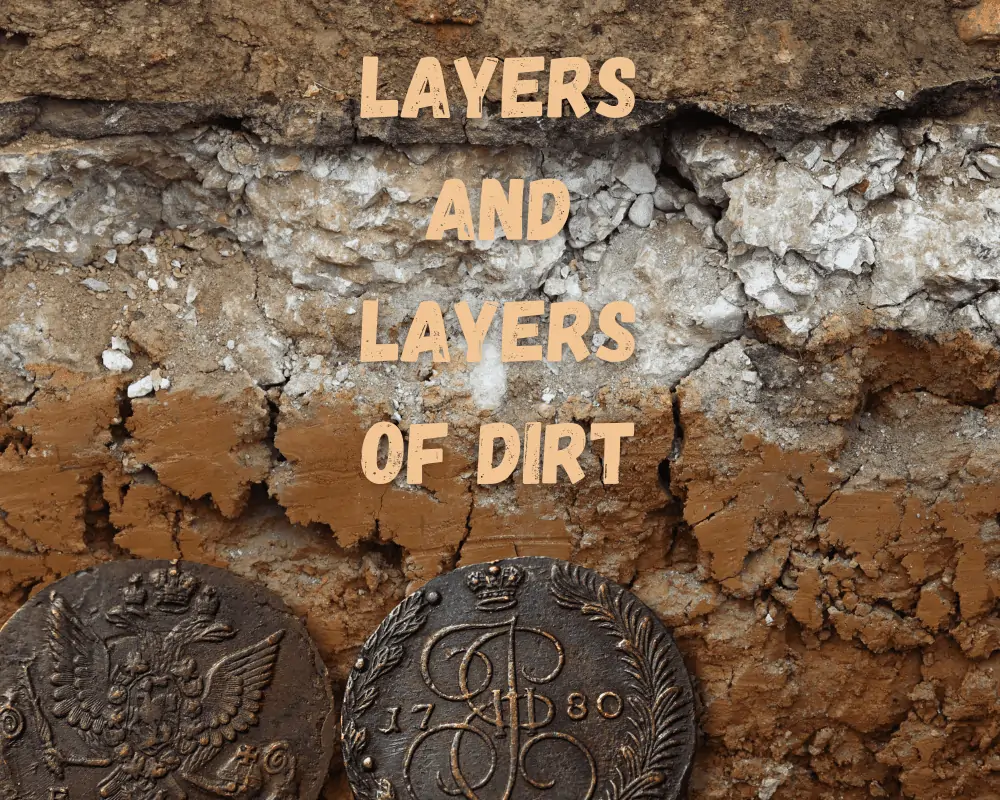
And to recap, our preferred methods of cleaning old copper coins found in the ground are:
- The Sebum Method – Rub off layers of dirt, and apply facial oil to darken the patina and enhance features.
- The Distilled Water Method – Soak copper coins in distilled water for a few hours, then use a soft cloth to brush away the remaining dirt.
- The Hydrogen Peroxide Method – Soak copper coins in hydrogen peroxide for a few hours, then use a soft cloth to dry the copper coin completely.
Well, we hope you found this post helpful. In no way is our preferred method the end all and be all of copper coin cleaning, so we recommend you give some of these a try on your own.
You may find your results differ from ours and that’s ok. Each method will vary in effectiveness depending on the metal, its condition, and the varying mixtures of cleaning solutions.
In the end, you want a copper coin that looks great and has value to YOU, whether it’s clean or dirty.
Be sure to keep an eye out for our next article in the cleaning series where we take on how to clean iron found metal detecting.
Until then!



